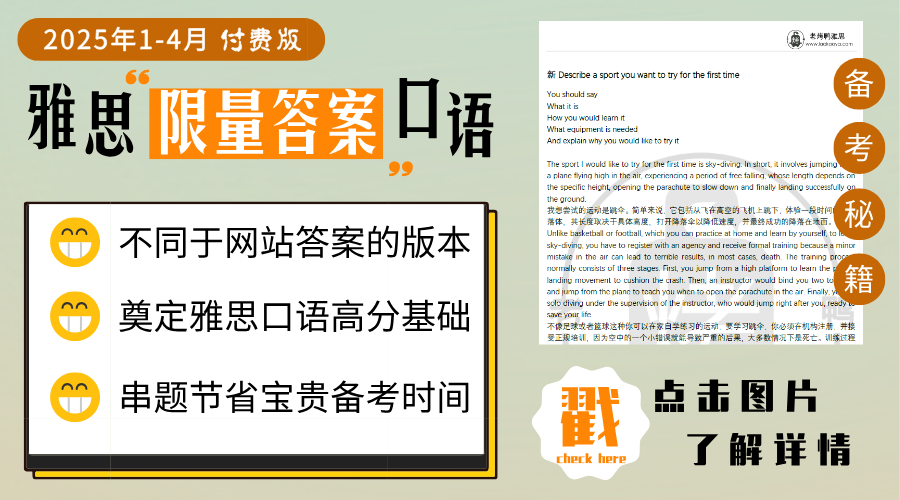剑桥雅思13Test2Passage1阅读答案解析 Bring cinnamon to Europe 肉桂的欧洲贸易
剑桥雅思13阅读第二套题目第一篇文章的13道题由9道填空和4道TRUE/FALSE/NOT GIVEN判断组成。由于文章叙事清晰,题目也都是顺序出题,因此难度较小,希望大家都能全对。下面是具体每道题目的答案解析。
点击查看这篇雅思阅读对应的原文翻译与其中出现的需要大家掌握的高频词汇:
剑桥雅思13Test2Passage1阅读原文翻译 Bring cinnamon to Europe 肉桂在欧洲的历史
雅思真题阅读词汇 剑桥雅思13 Test 2 Passage 1 肉桂贸易在欧洲的发展
剑桥雅思13 Test2 Passage1阅读答案解析
第1题答案:oils
对应原文:第1段:It was known in biblical times, and is mentioned in several books of the Bible, both as an ingredient that was mixed with oils for anointing people’s bodies
答案解析:根据biblical times定位到第1段的这句话,空前词added to与mixed with同义替换,由此确定答案为oils。
第2题答案:friendship
对应原文:第1段:and also as a token indicating friendship among lovers and friends.
答案解析:顺着上一题往下,根据题干并列关系与and的对应定位到这句话,空前词show与indicating同义替换,由此确定答案为friendship。
第3题答案:funerals
对应原文:第1段:In ancient Rome, mourners attending funerals burnt cinnamon to create a pleasant scent.
答案解析:根据ancient Rome定位到这句话。从题干可以推断出空上填的应该是某种场合,因此锁定funerals。除此之外,我们也可以根据词性,辅助判断funerals为答案。
第4题答案:wealth
对应原文:第1段:In the Middle Ages … used it to flavour food, particularly meat … as a sign of the wealth at his or her disposal.
答案解析:根据Middle Ages,food和meat的对应定位到第1段的后半部分。indication与sign同义替换,由此确定答案为wealth。
第5题答案:indigestion
对应原文:第1段:Cinnamon was also reported to have health benefits, and was thought to cure various ailments, such as indigestion.
答案解析:这道题主要考察treatment与cure的同义替换。题干问的是“能够治疗___与其他健康问题”,由此推断空上应该填一种具体的疾病,锁定indigestion。
第6题答案:India
对应原文:第2段:They took it from India, where it was grown
答案解析:这道题与上一题相隔较远,不过我们可以先找到第7题题干中Mediterranean在原文中的对应点,然后往前推。grown原词出现,空上应该填一个地点,由此确定答案为India。
第7题答案:camels
对应原文:第2段:on camels via an overland route to the Mediterranean
答案解析:根据Mediterranean定位到第2段的这句话,从题干可以推测空上填的应该是种工具,由此确定camels为答案。
第8题答案:Alexandria
对应原文:第2段:Their journey ended when they reached Alexandria.
答案解析:从题干推测空上应该填一个地中海地区具体的地点。很容易确定Alexandria为答案。
第9题答案:Venice
对应原文:第2段:European traders … then brought it back to Venice. The spice then travelled from that great trading city to markets all around Europe.
答案解析:题干问的是“商人将它带到____,然后卖向欧洲四处的地方”。可见空上填的仍然是个地点,由此确定Venice为答案。
第10题答案:TRUE
对应原文:第3段:In 1518, the Portuguese built a fort on Ceylon, which enabled them to protect the island, so helping them to develop a monopoly in the cinnamon trade
第4段:When the Dutch arrived off the coast of southern Asia at the very beginning of the 17th century
答案解析:原文中提到,16世纪的时候,葡萄牙人文章来自老烤鸭雅思确立了肉桂贸易的垄断地位,而荷兰人在17世纪的时候才到达该岛。可见葡萄牙人在整个16世纪都控制着肉桂贸易,由此判断答案为TRUE。
第11题答案:FALSE
对应原文:第4段:When the Dutch arrived off the coast of southern Asia at the very beginning of the 17th century … By 1658, they had permanently expelled the Portuguese from the island, thereby gaining control of the lucrative cinnamon trade.
答案解析:这道题需要结合第4段的开头和结尾来看。荷兰人在17世纪初的时候到达锡兰,然后在1658年的时候才控制肉桂贸易。题干中as soon as的描述与此不符,由此判断答案为FALSE。
第12题答案:NOT GIVEN
对应原文: 第5段:the Dutch began cultivating their own cinnamon trees to supplement the diminishing number of wild trees available for use.
答案解析:原文中确实提到荷兰人培育自己的肉桂树以弥补野生树木的不足,但对两者的产量则没有提及。题干属于无中生有,由此确定答案为NOT GIVEN。
第13题答案:FALSE
对应原文:第6段:By the middle of the 19th century … the spice trade overall was diminishing in economic potential
答案解析:根据题干找到19世纪之后需要读到段落结束才能够进行判断。原文中描述,当时香料贸易的经济潜力已经在缩减。题干中maintained its economic importance的描述与此不符,由此判断答案为FALSE。
剑桥雅思13Test2Passage2阅读答案解析 Oxytocin 催产素
剑桥雅思13Test2Passage3阅读答案解析 Making the most of trends 如何从潮流中获利



第一题,oil忘记+S可以吗
2023-09-25 14:54不行的,这个是会扣分的
2023-09-25 15:26哦
2023-11-29 19:39